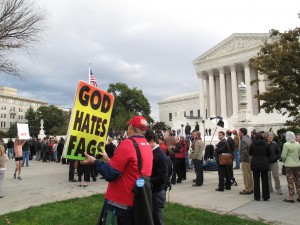
WASHINGTON (CNN) — A Kansas church notorious for its angry, anti-gay protests at military funerals will continue the controversial practice despite new restrictions in a bill passed by Congress that awaits President Barack Obama’s signature.
“That’s really not going to change our plans at all,” Westboro Baptist Church spokesman Steve Drain told CNN on Friday. “We’re going to continue to do that. We’re also going to continue to obey all laws.”
The next planned protest is at a military funeral Saturday in Lincoln, Nebraska, and Drain said: “We’ll be out there, doing our thing.”
Under provisions of a comprehensive veterans affairs bill that won final congressional approval Tuesday, protesters must be at least 300 feet from military funerals from two hours before they start until two hours after they end.
Violators could face unspecified fines and up to two years in prison.
“Protests that encroach upon the funerals and burials of our fallen soldiers are repugnant and inappropriate — and they undermine the respect military families and loved ones undeniably deserve,” said a statement by retiring Sen. Olympia Snowe, R-Maine, who sponsored the provisions.
Snowe, who has complained about the partisan divide in Washington, expressed gratitude to Congress for passing the bill “to protect the solemn moments of military funerals from outside disruption.”
The Westboro church, led by pastor Fred Phelps, believes God is punishing the United States for “the sin of homosexuality” through events including soldiers’ deaths.
Members have traveled the country to protest at military funerals and other events, evoking outrage by shouting at grieving families and displaying such signs as “Thank God for dead soldiers,” “God blew up the troops” and “AIDS cures fags.”
“The Lord has just granted us another round of preaching opportunity here,” Drain said, accusing Congress of enabling homosexuality with its attempt to “keep Bible preaching away from funerals.”
Funerals are one of the few events where “people will take a really serious look at really moral matters of heaven and hell,” Drain said. The purpose of the church’s protests was to influence the people attending the funerals, he added.
“If you flip off God, if you disobey the standards of God, you will incur God’s wrath,” he said. “What we’re trying to do is get people to wake up and smell the coffee.”
The new restrictions expand on provisions in a federal law passed in 2006 that banned protests within 300 feet of national cemeteries from an hour before a funeral to an hour after it, with violators facing fines and up to a year in prison.
Last year, the Topeka, Kansas, church won an appeal at the U.S. Supreme Court in a case that tested the competing constitutional rights of free speech and privacy.
The case involved a protest by Westboro members outside the 2006 funeral for Lance Cpl. Matthew Snyder in Westminster, Maryland, near Baltimore.
Snyder’s family sued the church in 2007, alleging invasion of privacy, intentional infliction of emotional distress and civil conspiracy. A jury awarded the family $2.9 million in compensatory damages plus $8 million in punitive damages, which were later reduced to $5 million.
The church appealed the case in 2008 to a federal appeals court, which reversed the judgments a year later, siding with the church’s allegations that its First Amendment rights were violated. The case then went to the Supreme Court, which issued a narrow ruling based on the facts of the specific appeal.
By an 8-1 vote, the high court said members of Westboro Baptist Church had a right to promote what they call a broad-based message on public matters such as wars.
A majority of states across the nation have responded to the protests with varying levels of control over the Westboro church protesters. In addition, counter-protesters including bikers and even people dressed as zombies have turned out at some Westboro church demonstrations.
Drain said a legal challenge to the new restrictions was possible.
“We’re keeping our options open,” he said. “Any law that unnecessarily restricts our freedom of religious expression is always going to be open to challenge.”
He added: “That’s all we care about here. We’ve got to preach.”
Church members say they believe U.S. soldiers deserve to die because they fight for a country that tolerates homosexuality.
The congregation is made up mostly of Phelps and his family. The pastor has 13 children, at least 54 grandchildren and seven great-grandchildren.
He described himself as an “old-time” gospel preacher in a CNN interview in 2006, saying, “You can’t preach the Bible without preaching the hatred of God.”
Drain said the freedom of expression fight waged by the church benefited all of society, including the news media.
“It’s in everybody’s best interest, including yours, that those sidewalks remain a platform, a forum for open and robust debate,” he said.
CNN‘s Bill Mears contributed to this report.











